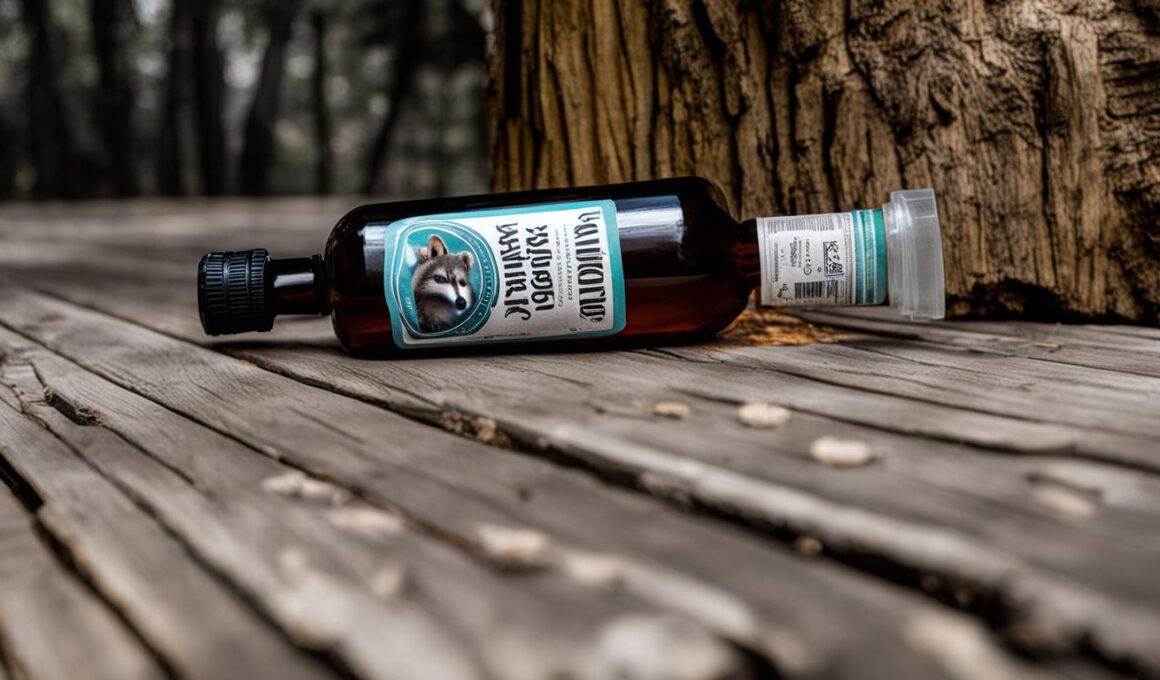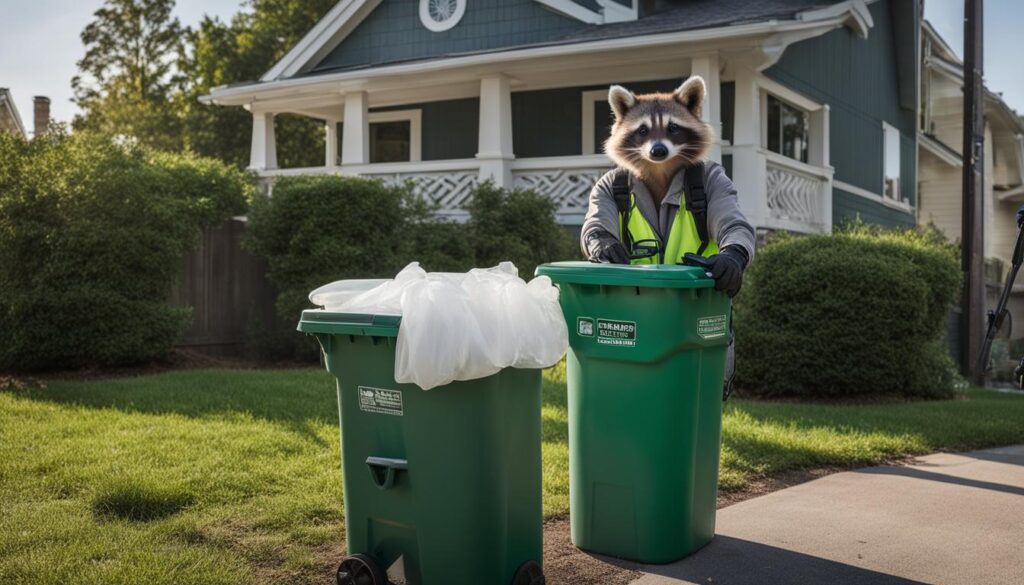Welcome to our article on effectively getting rid of raccoons with ammonia! If you’re dealing with raccoon issues on your property, you may have heard that ammonia can be used as a raccoon repellent. In this section, we’ll explore whether ammonia is an effective method and provide some tips on safe usage.
Raccoons are known to avoid areas that are contaminated with the urine of other raccoons or potential predators. Ammonia has a similar smell to urine, which is why some people believe it can repel raccoons. However, it’s important to note that raccoons can become accustomed to the smell or simply remove any ammonia-soaked rags. Therefore, relying solely on ammonia as a raccoon repellent may not yield the desired results.
While there are no registered raccoon repellents, it’s important to consider other methods that have proven to be more effective. Habitat modification is a key strategy in deterring raccoons from your property. This includes keeping your trash cans sealed, closing off potential entryways, and trimming tree branches that provide raccoons with easy access to your property.
Instead of solely relying on ammonia, it’s essential to focus on more reliable and preventative measures that discourage raccoons from frequenting your property. By implementing these effective methods, you can peacefully coexist with wildlife while keeping your property raccoon-free. Let’s dive deeper into why ammonia may not be the best option.
Why Ammonia Is Not Effective
The use of ammonia as a raccoon repellent is not recommended for several reasons. First, ammonia is corrosive and toxic, which can cause damage to your property and pose risks to the health of your pets and children. Using a harmful substance like ammonia puts your loved ones at unnecessary risk.
Second, raccoons are smart creatures that can quickly adapt to their environment. They can become accustomed to the smell of ammonia or simply avoid ammonia-soaked areas. This means that over time, raccoons may no longer be deterred by the presence of ammonia.
Additionally, using ammonia as a repellent can actually be counterproductive. Instead of being driven away, raccoons may be encouraged to find new hiding spots on your property, making it more challenging to get rid of them. Resorting to ammonia as a repellent can exacerbate the problem rather than solve it.
Finally, using ammonia and other repellents can be expensive in the long run. Continuously purchasing and applying ammonia can add up over time, without providing a lasting solution to your raccoon problem.
It is best to avoid using ammonia altogether and instead focus on more effective deterrent and prevention methods that do not pose risks to your property, health, or wildlife.
Choosing safer alternatives to ammonia is key to ensuring a raccoon-free environment and peace of mind for you and your loved ones.
Better Deterrent and Prevention Options
Instead of relying on ineffective repellents like ammonia, there are better strategies for deterring raccoons from your property. By implementing these proactive steps, you can effectively protect your home and maintain a raccoon-free environment.
Seal Entry Points and Hideaways
Raccoons can enter your property through small openings, such as gaps in the foundation, vents, or deteriorating areas of your home. It’s essential to meticulously seal these entry points to prevent raccoons from gaining access. Additionally, check for potential hideaways, such as areas under decks or sheds, and secure them to eliminate possible hiding places for raccoons.
Maintain Trees and Lawns
Raccoons are skilled climbers and can use overhanging tree branches to access your property. Regularly trim trees near your house and remove any branches that could serve as a bridge. Keeping your lawns well-maintained and free of debris also helps eliminate potential hiding places for raccoons.
Protect Your Trash
Raccoons are notorious for scavenging through trash cans in search of food. To prevent this, make sure your trash cans have tight-fitting lids that cannot be easily opened by raccoons. Securing your trash will discourage raccoons from rummaging through it and making a mess around your property.
Feed Animals Indoors
If you have pets that eat outside, it’s essential to feed them indoors. Leaving pet food outside can attract raccoons and increase the likelihood of them visiting your property. By feeding your animals indoors, you eliminate a potential food source for raccoons and reduce their presence around your home.
Seek the Help of a Wildlife Control Professional
If you’re dealing with persistent raccoon issues or want to ensure safe removal, it’s advisable to consult with a wildlife control professional. These experts have the knowledge and experience to handle raccoon infestations effectively and humanely. They can identify raccoon dens, develop a customized removal strategy, and help you protect your property from future raccoon encounters.
By following these better deterrent and prevention options, you can take control of raccoon problems and maintain a raccoon-free environment without relying on ineffective repellents like ammonia.
Conclusion
When it comes to raccoon control, relying on ammonia as a repellent is not a safe or effective method. These clever creatures can quickly adapt and find new hiding spots on your property, rendering the ammonia useless. Instead, it’s important to focus on habitat modification and prevention techniques to keep raccoons at bay.
Sealing entryways, maintaining trees and lawns, and securing your trash with tight-fitting lids are effective ways to deter raccoons. Additionally, feeding your pets indoors and consulting with a wildlife control professional can provide you with safe and effective raccoon control strategies.
By following these methods, you can successfully get rid of raccoons and protect your property without relying on ineffective repellents. Remember, creating an environment that is unsuitable for raccoons is the key to long-term raccoon control. Stay proactive and take the necessary steps to safeguard your property from raccoons.
Can Ammonia also be used to get rid of Yard Stickers?
Yes, ammonia can effectively get rid of yard stickers. Simply mix ammonia with water and spray it over the affected areas. The ammonia will help kill the stickers and make it easier to remove them. This method is a cost-effective and efficient way to get rid of yard stickers.









